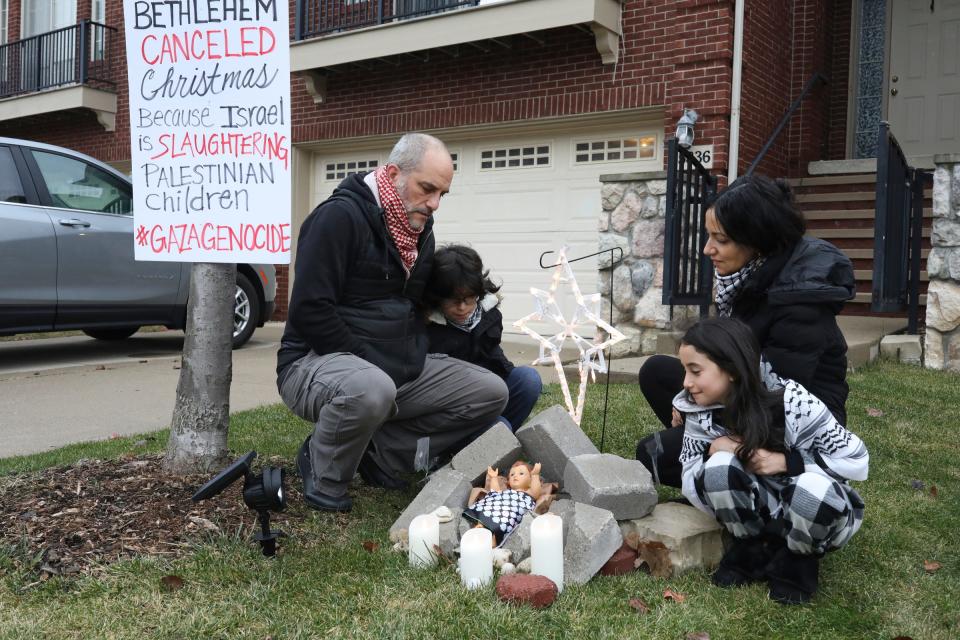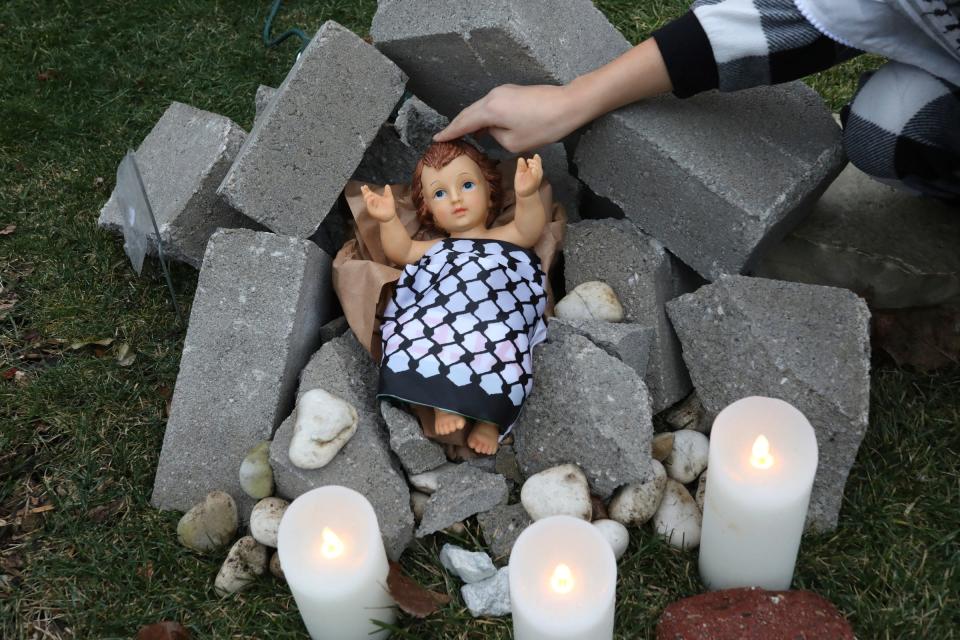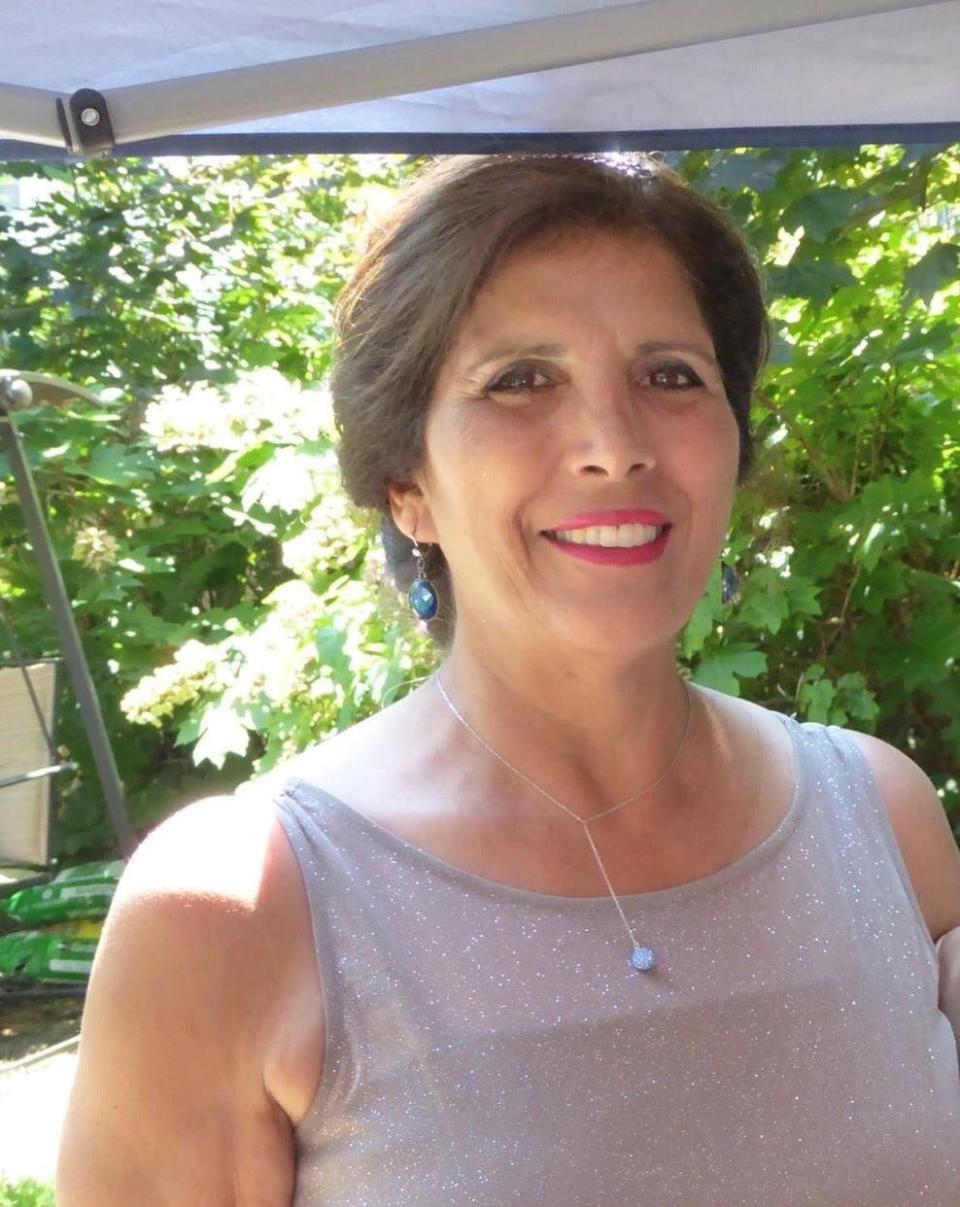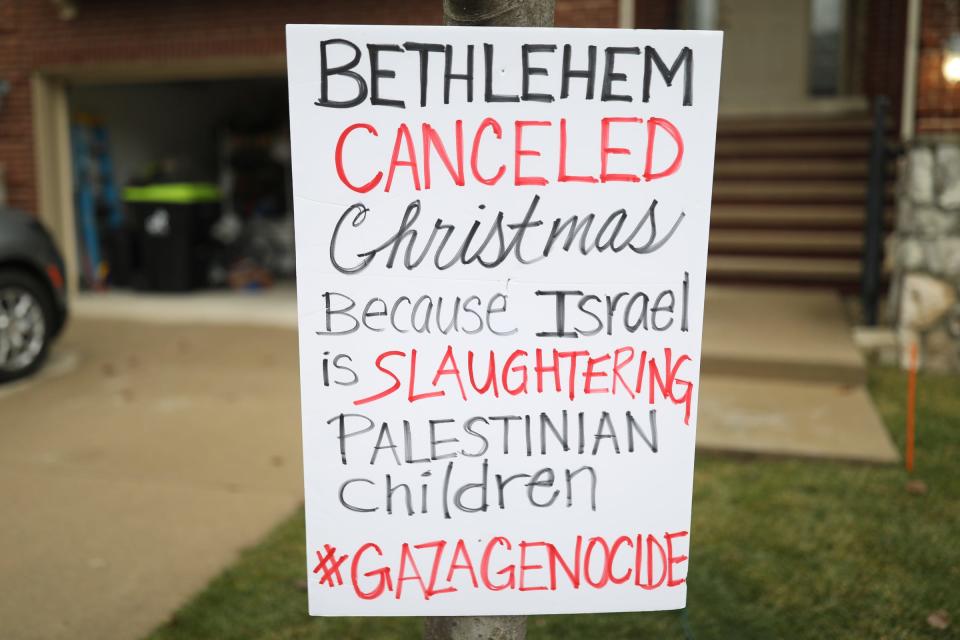Palestinian Christians in Michigan struggle to celebrate Christmas amid Gaza war
For the Christmas season, Huwaida Arraf often goes all out decorating her home in Macomb Township. Born to Palestinian Christian immigrants, Arraf cherishes Christmas as a joyous time, especially for a community that has roots in the area where Jesus was born.
"Usually, our house would be the most lit in our neighborhood," said Arraf, 47. "We had lights on our lawn, reindeer and elves and candy canes, the whole nine yards."
But this season, the mood is quite different as the Palestinian death toll from Israeli strikes over the past two months has reached a level not seen in memory. The Arraf family's decorations and lights are now just sitting in their garage.
Related: Jews in Michigan mark Hanukkah with resolve amid fears
In their place is a nativity scene Arraf created on her lawn with a baby Jesus resting on a pile of rubble, symbolizing the destruction in Gaza. It echoes a display created this month at a Lutheran church in Bethlehem, a Palestinian city in the West Bank where Jesus was born, that shows the child wrapped in a Palestinian scarf atop the rubble.
Near the display, Arraf put up a sign that reads: 'Bethlehem Canceled Christmas Because Israel Is Slaughtering Palestinians #GazaGenocide.'

"It is definitely a challenge to feel any joy at this time," said Arraf, an attorney and mother of two who was raised Catholic. "The struggle for me is: I have two young kids and this is their favorite time of the year and you don't want to disappoint them. But at the same time, it's kind of impossible to engage in the festivities because we're witnessing a genocide. ... Even going through the act of buying gifts, you feel guilty. One feels guilty being able to open the fridge to get a snack, because you know millions don't have water to drink. ... But at the same time, I don't want to really traumatize my kids."
Arraf's views are felt by many Palestinian American Christians in Michigan who are scaling back on Christmas celebrations and donating money to help Palestinians instead of buying gifts. Traumatized by the scenes out of Gaza and the West Bank, some say they are having terrifying flashbacks to when their own families were driven out of the region. There are thousands of Christians of Palestinian descent who live in metro Detroit, one of the largest communities in the U.S., according to census data and community leaders.
"How could you celebrate when you see the slaughter of kids?" said Terry Ahwal, 67, of Farmington Hills, a Palestinian American Christian who immigrated to Michigan from the West Bank as a teenager after her family faced persecution from Israeli security forces. "How could you? I have nightmares, the nightmares knowing what I saw is unfolding again. But it's more intensified."
Israel declared war against Hamas in response to the group's Oct. 7 surprise attack that killed about 1,200 people, mostly civilians, in southern Israel. Hamas also took about 240 people hostage; around half remain in Gaza after an exchange for Palestinians imprisoned in Israel last month.
In over two months of bombardment of the Gaza Strip since then, more than 20,000 Palestinians have been killed, officials there said on Friday. More than half-a-million people in Gaza are starving, a U.N. report said Thursday, amid a worsening humanitarian crisis in the occupied territory that has also seen vast numbers of people displaced from their homes. Israel has accused Hamas of using civilians as human shields, an accusation denied by the militant group.
Ahwal's life and work is an example of how Palestinian American Christians have been a vital part of the Middle Eastern community in Michigan, helping forge a proud Arab identity regardless of faith in the face of racism and bias. Ahwal is on the executive committee of a national group based in Westland of Palestinian Christians with roots in the West Bank city of Ramallah, the American Federation of Ramallah, Palestine (AFRP), which has been raising money to help victims in Gaza. Decades ago, Ahwal was the director of the Detroit chapter of the American-Arab Anti-Discrimination Committee. In Michigan, the Palestinian Christian community is largely Orthodox and Catholic, with a smaller number of Protestants or evangelicals. Some Palestinian Christians also celebrate Christmas on Jan. 6, as do many other Orthodox Christians.

Ahwal, who is Catholic, has fond memories of celebrating Christmas growing up in Ramallah and in Livonia, a city with hundreds of Palestinian Christian families and home to the Basilica of St. Mary, an Antiochian Orthodox church with hundreds of Palestinian congregants. She notes how their families combine Arab and American traditions and attend midnight Masses.
"We have families that came over Christmas Eve and Christmas Day," Ahwal said. "You buy new toys, candy, you pray. ... Lots of food, lots of celebration, all kinds of Arabic food. We exchange gifts. Santa Claus used to come to my house in a convertible red Cadillac."
Lori Ajlouny, 59, a Palestinian Christian who lives in Birmingham, also has warm memories of celebrating Christmas in Ramallah, where she was born. Her parents were forced to flee their homes during the founding of Israel, known to Palestinians as the Nakba, and later moved to the U.S. in the 1960s after life in the West Bank became unbearable for them, Ajlouny said.
During Christmas, Palestinians are usually "smiling and kissing you and hugging and wishing you a very Merry Christmas," Ajlouny said. "We hug. Arabs are very demonstrative and symbolic of showing you respect and your love of each other. It's usually two or three kisses on the cheek."
But now, "it's very subdued," she said. "People are just nodding to each other, heads are low, hearts are broken. ... I have not stopped crying. It's just been so difficult to think of the devastation."
Before this year, Ajlouny would give three Christmas gifts every holiday season to each of her children, the number three representing the three gifts that newborn Jesus received from a group of wise men.
But "this year, I told them, you're getting only one and the money that I would have spent on the other two gifts, we're donating to Gaza," she said. "And they were so fine with that. They were really understanding, didn't question the decision. I was very proud of their maturity and their ability to recognize the need."
As with Arraf, her extensive house decorations for Christmas are also absent this year.
She usually goes all out, "with these beautiful lighted Christmas balls, then all the trees in the front are lit up with colored lights and I put a wreath across," Ajlouny said.

"But this year, we had only one thing ... a lighted cross" on a front window. "All the Palestinians have left is one thing, and it's faith. That's it. Everything else was stripped from them. ... And the cross symbolizes the faith we have in God."
Ajlouny said her 90-year-old father, Joseph, who lives with them, has been devastated these past couple of months. He had to live in hiding for months after fleeing his home during the founding of Israel, she said.
"My parents lived through the first Nakba barely and now they're living through a second," she said. "He's so stoic ... but now all he's doing is crying."
Ajlouny attended an interfaith event for Gaza on Tuesday in Dearborn, at which Cornel West, an independent presidential candidate and philosophy professor, delivered they keynote. The Rev. Jack Eggleston, a former pastor at local Lutheran churches who was once assistant to the Bishop of the Evangelical Lutheran Church of America in southeast Michigan, spoke to the crowd before West. On the screen behind Eggleston as he spoke was a photo of the nativity scene in the Bethlehem church with Jesus on a pile of rubble. He made connections between the suffering of Jesus and the suffering of Palestinians, a connection Palestinian American Christians often make.
"God is in the rubble," Eggleston said. "If Jesus were born now, he would be born like he was then, under occupation, in the midst of rubble, perhaps with the sound of bombs around him."
He then led the crowd at Greenfield Manor in chants of: "Ceasefire now."
More: Cornel West in Dearborn: 'A Palestinian baby has the same value as any baby in the world'
Ahwal said: "Christ was one of us. And he went through what we were going through."
Ahwal and other Palestinian Christians said they are worried the attacks during the past two months will further erode the presence of Christians in what's described as the Holy Land. Ahwal said she has had family members attacked in the past by Israeli forces. Christians used to make up most of Ramallah, but are now a minority. Christians are also now a minority in nearby Bethlehem.
Palestinian Christians sometimes see themselves as an ignored group, one that is caught between extremist factions. They feel left out of the discussions the U.S. government has with Arab American and Muslim advocates. Historically, they were aligned more with secular Palestinian movements, which have grown weaker with the rise of religious movements both in Israel and the Muslim world. A report this month in the New York Times said that Israeli Prime Minister Benjamin Netanyahu had encouraged payments from Qatar to Hamas as part of a strategy to undermine the Palestinian Authority.
Some have "basically marketed this conflict as Muslims versus Jews," Ahwal said. "And that's not the case."
There are 8,929 residents in Michigan who have Palestinian ancestry, out of 174,887 nationally, according to 2020 census data released in September. That number doesn't include some who may have written their ancestry on the census form as Arab. Advocates say the government data undercounts their actual numbers. Ahwal estimates there are about 15,000 Palestinian Christian families in Michigan with roots in Ramallah.
There are also thousands of Palestinian American Muslims in Michigan; the largest Palestinian-majority mosque in the state is the Islamic Center of Detroit. Most of those killed over the past two months were living in Gaza, which is largely Muslim, but there has also been many deaths in the West Bank, where most of the Palestinian Christians in Michigan have roots. At the interfaith event with West, Arraf and the imam of the mosque were among the speakers.
Palestinian Christians attend several churches in the region of different denominations. Ajlouny attends Our Lady of Redemption Melkite Catholic Church in Warren, whose congregants are a mix of Palestinian, Jordanian and Syrian Americans. Arraf was raised Catholic, but her parents now attend an Orthodox church.

Former U.S. House Rep. Justin Amash of west Michigan, who is Christian and of Palestinian descent, has been outspoken in recent weeks about some of the Israeli attacks on Christian sites in Gaza. Amash said in October that some of his relatives were killed after an airstrike hit the Church of Saint Porphyrius, a Greek Orthodox congregation where some had taken shelter.
"Christmas is supposed to be a time of joy and celebration," Amash wrote on X on Dec. 17. "But for Christians in Gaza—whose family members have been killed or maimed, whose homes and churches have been destroyed or badly damaged, and who suffer through sleepless nights of bombings—this Christmas will be one of great sadness and mourning. Please pray for peace."
Arraf has been busy for the past couple of months speaking out in support of Palestinians at rallies and interfaith events. But she's still trying to make sure her children are able to celebrate some parts of Christmas.
"They'll get a gift from Santa and we'll get a gift from their relatives," Arraf said. "But it's not the same joy in the festivities that they're used to and they know why. They haven't complained at all that we ... didn't go see Santa this year. It's very difficult to celebrate, to get into the season."
The Associated Press and the USA Today Network contributed to this report.
Contact Niraj Warikoo: nwarikoo@freepress.com, Twitter @nwarikoo, Facebook @nwarikoo.
This article originally appeared on Detroit Free Press: Palestinian Christians in Michigan unable to celebrate Christmas

